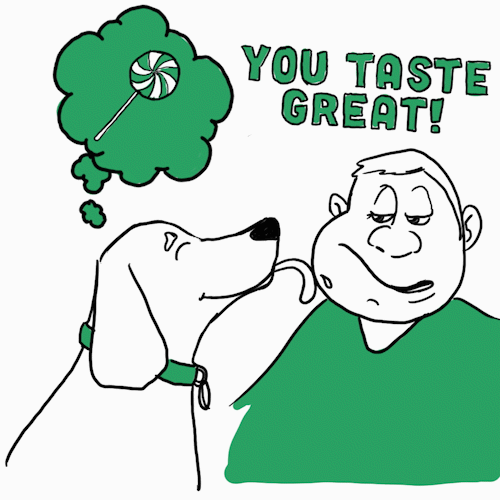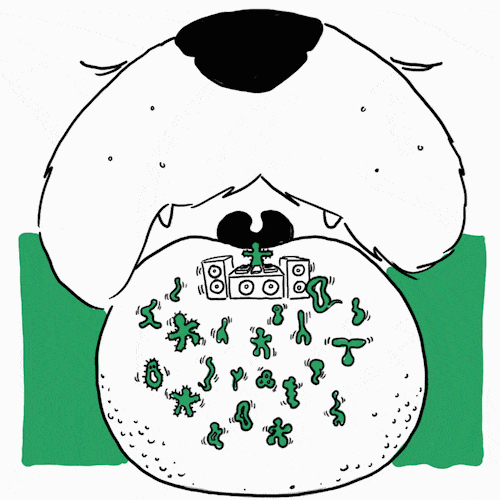

There’s no doubt that dogs are affectionate creatures. And they have numerous ways of showing it. One of these ways is by licking their owners. You may enjoy it when your furry friend comes up and gives you a big ol’ pooch smooch. But why do dogs lick you? In a poll* of dog owners, IAMS™ found a large majority (75%) believe dogs lick people to offer signs of friendliness. That’s definitely a correct assumption. Let’s dive a bit deeper for a better understanding.
Licking has been a social behaviour among dogs since the days of the great-great-great granddaddy wolf. 'It’s a standard canine greeting to lick others around the face,” agrees James Serpell, B.S., Ph.D., Professor of Humane Ethics & Animal Welfare at the University of Pennsylvania School of Veterinary Medicine. “Junior members of the pack will run around and lick the mouths of more senior members.” But is that all that there is to dog licking behaviour? Or are there more reasons why dogs lick people? Let’s find out!

Here are a few reasons that can explain why dogs like to lick.
For dogs, licking is equivalent to kissing or showing affection. You may have noticed female dogs licking their puppies which is a behaviour that is intended to show affection. And your dog considers you part of their pack, so they show you affection the same way their kind does - by licking.
Dogs are oral creatures and gather a lot of information about their surroundings through taste and smell. Maybe you’re salty after a sweaty run. Maybe you’ve got barbecue sauce on your face. “Dogs can smell a lot better than we can,” says Dr. Jo Gale, BVetMed CertLAS MRCVS, Senior Manager, Global Science Advocacy at Waltham Petcare Science Institute, “so they find a lot more things interesting to lick than we can.” This is despite the fact that dogs only have about 1,700 taste buds compared to around 9,000 in humans.
Have you been too busy with work lately? Or has anything kept you inattentive toward your pooch? If so, it’s probably one of the reasons why your dog is licking you. It is also possible that your dog just got too bored and wants you to play with them, which is why they’re suddenly licking you.
That’s true. Much like humans, dogs can also suffer from obsessive-compulsive disorder, which can be concerning. It is often triggered due to stress and anxiety and makes the dogs suddenly begin licking. You will need to visit your vet if you suspect this to be the case.

Unlike humans, no other animals have knowledge about or access to proper healthcare. So, when they get injured, their first instinct is to lick their wounds. This helps them numb the pain to a certain extent, and also clean the wound. Thus, when your dog sees a wound on you, their natural instincts kick in and they try to help you by licking the wound, thinking it will clean the wound and lower the pain.
In fact, in ancient Greece, dogs at the shrine of Asclepius were trained to lick patients. In the Middle Ages, Saint Roch was said to have been cured of a plague of sores through his dog’s licking. The French even have a saying, “langue de chien, langue de médecin,” which translates to, “a dog’s tongue, a doctor’s tongue.”
Don’t cancel your health insurance just yet. While a dog’s saliva does have some possible bactericidal properties against some types of bacteria, it can put you at risk of exposure to others. Too much licking can also reopen the wound and cause further infection. With modern medicine, you’re much better off hitting the first-aid kit. And that myth about dogs’ mouths being cleaner than humans’? Not true — both contain over 600 types of bacteria.
While an occasional canine kiss is “aww”-inducing, some dogs can overdo it to the point of annoyance. When this happens, the best thing to do is “completely ignore it and give no attention,” suggests Dr. Jo Gale. “When they stop, provide them with attention.” This acts as a form of positive reinforcement. Over time your dog will learn to scale back on the smooches. Another thing you can try is training them to cut back on the licking. Remember to use positive reinforcement in this case too - reward them with treats or toys when they display good behavior.
If you're looking for the perfect dog for you, try our Dog Breed Selector today and enjoy a lifetime of tail-wagging joy.
Yes, but not always. For dogs, licking is also a way to explore and understand the world and the beings around them. Sometimes it can also be an indication of their OCD.
Your dog may be licking you because of either of these reasons - to show affection, to seek your attention, because they like how you taste, or because they are feeling stressed or anxious.
If a dog keeps licking constantly, it may be because they are feeling anxious or stressed. Sometimes these feelings also trigger OCD in dogs, which can make them lick obsessively. They may also do it when they are bored and want your attention.
Sometimes, dogs choose to show dominance via licking. They may do this with either other dogs of the pack or with humans. Dog licking may indicate dominance especially when the licks are uninvited, and the dog begins showing dominant behaviour. This can include not obeying commands and acting in a demanding way.
A dog’s licking may indicate several things. They are either showing affection or are just bored and need your attention. They may also lick you if they think you taste good or interesting.


When it comes to maintaining the overall health of our dogs, we often overlook the importance of their gut health. This is where canine probiotics and prebiotics come into play. These are beneficial microbes that reside in your dog's gastrointestinal system, aiding in food digestion, fighting off potential pathogens, and bolstering the immune system.
Probiotics for dogs, derived from the Latin word 'for' (pro) and the Greek 'life' (bio), are friendly bacteria and yeasts that are essential for your dog's health. They are designed to restore and maintain a healthy balance of microflora in your dog's gut. The types of bacteria usually found in canine probiotics include:
Prebiotics may sound like the opposite of probiotics, but in reality, the two go hand in hand. Prebiotics are nutrients that nourish and promote the growth of these good bacteria already living in the colon. They are essential in ensuring that probiotics function at their optimal best.
Probiotics are a necessary addition to a dog’s diet. Here are a few benefits of this nutrient:
They are generally used when the balance of microbes in a dog's gut gets disrupted due to stress, dietary changes, or antibiotic use, leading to health problems including digestive upsets.
Probiotics for dogs have been shown to help manage diarrhoea and improve gut health. They work by restoring the balance of good bacteria in your dog's gut, which can be disrupted due to various factors.
The benefits of probiotics for dogs extend beyond just good gut health. They can also aid in reducing the need for antibiotic treatment and shorten the duration of diarrhoea. In fact, a 2009 Irish study found that supplementation with a specific strain of Bifidobacterium Animalis reduced diarrhoea duration from seven to four days.
The answer is yes. Puppies can benefit from dog-specific probiotics. These can help them develop a balanced intestinal bacteria ecosystem, support a healthy immune system, and reduce the occurrence of diarrhoea, constipation, and infections of the digestive tract.
Yes, it's critical to consult your vet before introducing probiotics or prebiotics for dogs into your pet's diet. There are many probiotic preparations out there, and not all of them are of high quality and backed up with evidence. Your vet will be able to advise the best option for your dog.
As the importance of gut health in dogs becomes more recognised, various supplements containing canine probiotics have emerged. One such supplement is our IAMS™ Proactive Health™ Digestive Health Supplement. This soft-chew food supplement is a blend of prebiotics and probiotics that ensures healthy digestion.
If your dog has been experiencing signs like diarrhoea, constipation, bloating, or vomiting, it might indicate that their digestive system is not functioning properly. In this case, a probiotic supplement with Bacillus Subtilis and Fructooligosaccharide can be a good investment. They help degrade organic matter in the feces, reducing ammonia production and fecal odour as well as nourish the good bacteria in the colon of the dog.
The benefits of probiotics for dogs are substantial. They help maintain a healthy gut, which plays a vital role in your dog's overall health. By incorporating probiotics into your dog's diet, you're taking a step towards ensuring that your furry friend leads a healthier, happier life.